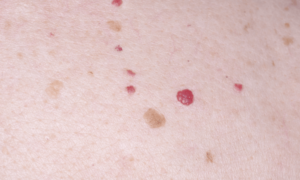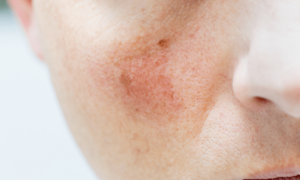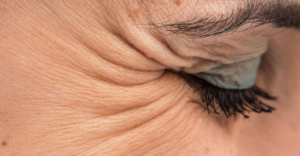Knowing your skin type is key to nailing your skincare routine. Understanding whether your skin is dry, oily, combination, sensitive, or normal is important. It can influence your daily skincare routine and the choice of products, ensuring better results and healthier skin. In this article, we’ll analyse simple methods to help you identify your skin type at home. It will help you to adjust your skincare routine for healthier skin.
What Determines Skin Type?
Skin type is mainly determined by genetics, but several other factors can influence it. Other factors include environmental conditions like humidity and pollution, your age, hormone levels, and even stress. Each factor can affect the amount of sebum (oil) your skin produces. Sebum plays a significant role in categorising your skin type.
The Different Skin Types
Understanding the features of different skin types is crucial in identifying your own:
- Normal Skin: The gold standard—well-balanced, not too oily or dry.
- Oily Skin: Characterised by a glossy shine and larger pores due to excess sebum.
- Dry Skin: Often flaky, rough, and dull, feeling tight throughout the day.
- Combination Skin: A mix of dry and oily, typically oily in the T-zone (forehead, nose, and chin) and dry on the cheeks.
- Sensitive Skin: Reacts easily to products or environmental triggers. It is often accompanied by redness or irritation.
Why Knowing Your Skin Type Matters
Identifying your skin type isn’t just about choosing the right skincare products. It’s about creating a personalised skincare regime. A routine that can prevent issues such as breakouts, premature ageing, and sensitivity. It will help you maintain optimal skin health and confidence.
How to Test Your Skin Type at Home
Here’s a simple method to help determine your skin type:
- Cleanse your face thoroughly with a gentle cleanser and pat it dry. Avoid applying any products afterwards.
- Wait for one hour and then observe your skin. This allows your skin to return to its natural state. The characteristics of which will help you determine your skin type.
- Dab your face with a tissue. Pay attention to the ‘T-zone’—the area of your forehead and nose.
- Assess the outcome:
- If the tissue has no oil and your skin feels tight, you likely have dry skin.
- If the tissue shows oil from the nose and forehead, your skin is a combination.
- Oily skin will leave oil on the tissue from all over your face.
- Normal skin will show no excess oil or flaking skin, and your face will feel smooth and supple.
- If your skin shows redness or feels itchy, sensitive skin is likely.

Adjusting Your Skincare Routine Based on Skin Type
Once you know your skin type, you can tailor your skincare products and routines:
- Normal Skin: Maintain with regular cleansing and moderate moisturising.
- Oily Skin: Use oil-free and non-comedogenic products to avoid clogging pores.
- Dry Skin: Focus on hydration with rich creams and avoid harsh, drying cleansers.
- Combination Skin: You might need to use different products on different areas of your face.
- Sensitive Skin: Opt for hypoallergenic and fragrance-free products.
Common Misconceptions About Skin Types
When it comes to skincare, misinformation can lead to practices that do more harm than good. Let’s debunk some common myths about skin types and set the record straight. In doing so we can ensure you can make informed decisions about your skincare routine.
Myth 1: Oily Skin Doesn’t Need Moisturiser
Fact: People often think that moisturiser will make oily skin greasier, but the truth is quite the opposite. Oily skin produces excess sebum, which can be a sign of dehydration. Skipping moisturiser can cause your skin to produce even more oil to compensate for the lack of moisture. The key is to use a lightweight, non-comedogenic moisturiser. It will hydrate your skin without clogging pores.
Myth 2: You Can’t Do Anything About Sensitive Skin
Fact: While sensitive skin requires a more careful approach, it’s far from untreatable. The first step is identifying triggers. It can range from certain ingredients in skincare products to environmental factors. Use hypoallergenic, fragrance-free products designed for sensitive skin. It’s also a good idea to introduce new products gradually. This allows your skin to adapt without irritation.
Myth 3: Dry Skin Is Just a Cosmetic Issue
Fact: Dry skin can certainly affect your appearance, making it look dull and flaky, but it’s not just a superficial concern. Severely dry skin can become itchy and uncomfortable. It’s more prone to wrinkling and other signs of ageing. It’s important to hydrate the skin with appropriate moisturisers. Consider using a humidifier in dry environments to help maintain skin moisture levels.
Myth 4: Sunscreen Is Only Needed on Sunny Days
Fact: UV rays can penetrate clouds and even glass, so wearing sunscreen is essential every day. Even when it’s overcast or you’re indoors near windows you should wear sunscreen. UV exposure is a major factor in skin ageing and damage, regardless of your skin type. Opt for a broad-spectrum sunscreen with at least SPF 30 to protect your skin from harmful rays.
Final Thoughts
Understanding your skin type is a big step in achieving and maintaining healthy skin. We hope this guide empowers you to make informed decisions about your skincare. For more personalised advice on skin and our skin treatments, consider scheduling a consultation with one of our skin specialists. Remember, the right care can make all the difference.
FAQs on Skin Types
How can I find out my skin type at home?
Wash your face, wait an hour, and then dab your face with tissue paper to observe whether there’s oil, dryness, or a mix of both, indicating oily, dry, or combination skin respectively.
Why is knowing my skin type important?
Identifying your skin type helps you choose the right skincare products and routines to maintain healthy, balanced skin and prevent common issues like breakouts or irritation.
What factors can change my skin type?
Your skin type can change due to various factors such as age, hormones, environment, and lifestyle changes.
Does my skin type stay the same as I age?
No, skin type can evolve due to factors like hormonal shifts, environmental changes, and natural ageing processes.
How should I modify my skincare routine based on my skin type?
Tailor your skincare routine to your skin type: oily skin benefits from oil-free products, dry skin from hydrating creams, and combination skin may need a mix of both.




















